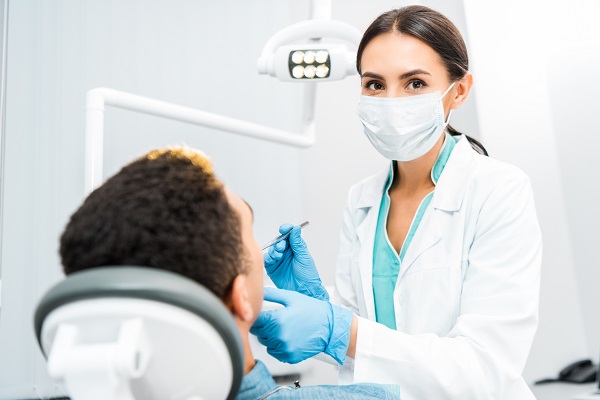Emergency Dentistry and the Coronavirus (COVID-19) Disease: Is a Metal Taste in the Mouth a Dental Emergency?

Curious about emergency dentistry during the coronavirus (COVID-19) disease pandemic? The COVID-19 disease has made it more challenging to get routine dental care, but many dentists still offer emergency dentistry services. Depending on its cause and severity, a metal taste in the mouth might require emergency dentistry treatment to ensure the issue does not worsen or linger for longer than necessary.
Emergency dentistry and COVID-19: Does a metal taste in the mouth constitute an emergency?
It is important to understand the severity of the concern if you experience a metallic taste in the mouth as it may lead to more serious issues if left untreated for too long. The following is an overview of emergency dentistry for a metal taste in the mouth and how to tell if the concern is a dental emergency.
What does a metal taste in the mouth mean?
There are many reasons why someone may have a metal taste in their mouth. One of the more common reasons is that it suggests that the patient has lost a metal filling. However, a metal taste could be the result of gingivitis and periodontitis (gum disease), particularly if either produces bleeding of the gums. In some instances, a metal taste is the result of a more severe oral infection.
Should I consider emergency dentistry for a metal taste in the mouth?
A metal taste in the mouth is always a concerning sign. However, whether or not it requires emergency dentistry treatment depends on the severity of the metal taste and other symptoms and the cause of the symptoms. If the metal taste is the result of a lost filling, then it could lead to an oral infection without prompt treatment. More severe cases of periodontitis in which there is a metal taste may require an emergency dentistry visit, as well. Minor symptoms such as bleeding gums while brushing that cause a metal taste require treatment but it may not be as urgent.
What treatment options are available for a metal taste in the mouth?
As is the case with just about any oral health concern, the best treatment option depends on the underlying cause. If the metal taste is caused by a lost or damaged metal filling, then the dentist may only need to clean the area and replace the filling. If the metal taste is caused by an infection, then a root canal might be in order.
How does the emergency dentistry treatment process work?
The first thing to do for those who experience a metal taste in the mouth is to call a dentist and explain the severity of the issue and other symptoms. They can then make a recommendation as to whether to monitor the situation at home or come in for emergency dentistry treatment if they feel the concern can spread, worsen or linger.
Find out more about emergency dentistry today
Get in touch with our dental team today to find out what you should do about a metal taste in your mouth. We can answer questions specific to your situation and help you get the prompt and effective emergency dentistry treatment and support you need during the COVID-19 outbreak.
Request an appointment here: https://www.ddsbaik.com or call Dennis Baik, DDS at (408) 676-5321 for an appointment in our San Jose office.
Check out what others are saying about our services on Yelp: Read our Yelp reviews.
Related Posts
Dental fillings are one of the oldest known methods of dental restoration. Dentists have been placing dental fillings for years as a way to stop damage and restore an unhealthy tooth. However, as modern dentistry has begun to take over, certain types of dental fillings are beginning to die out. Silver dental fillings were originally made…
Dental sealants offer patients a powerful defense against cavities. General dentists present this option to patients who need a little help preventing tooth decay. According to the American Dental Association, sealants are safe.Dental sealants provide extra protection to teeth, especially for those more prone to tooth decay. Preventing decay is essential to one's good oral…
Seeing a family dentist for a cavity treatment can target the problem teeth right away before they worsen. Many solutions are available. Discussing the process can help you make informed decisions. Here are the details on how your family dentist treats cavities.An individual cannot treat a cavity at home. The only way to get relief…
Composite bonding is one of the many treatments that might be used as part of your smile makeover. The procedure is often used to fix cosmetic problems such as discolored, cracked or chipped teeth. Dental bonding involves applying composite resin to the affected tooth to restore or improve its appearance.Composite bonding is a versatile treatment…


